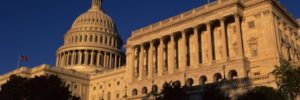CHN just released another edition of the Human Needs Report. Read on for the latest on Congress’s spending work, disaster aid on the horizon, a victory for LGBTQ Americans, attacks on immigrants, the poor, and workers, and more.
Archives: Voices
CHN calls on Senate to pass disaster relief — before Memorial Day recess
CHN is urging members of the U.S. Senate to take immediate steps to pass a disaster relief bill. CHN is calling on senators to pass a bill before Memorial Day recess that includes nutrition assistance funds for Puerto Rico and other territories in need; Medicaid funds for the U.S. territories of Northern Mariana Islands, Guam, and American Samoa; disaster funds for states, territories, and tribes; and humanitarian aid to assist unaccompanied minor children.
Victory! House passes bill to strengthen LGBTQ nondiscrimination laws
In a great step forward for social justice, the U.S. House on Friday approved the Equality Act, which would strengthen federal civil rights laws for LGBTQ Americans. The vote was 236-173, with eight Republicans joining all Democrats in supporting the measure.
Register now: Webinar to focus on Trump’s latest plan to deny assistance to those in need and how to fight back
The Trump Administration has put forth a proposal to change the way poverty is adjusted for inflation. Over time, this adjustment would reduce funding for essential human needs programs by billions of dollars. Millions of Americans would be affected, including children, seniors, people with disabilities, and others who are poor or near poor. On Wednesday, May 22, the Center on Budget and Policy Priorities (CBPP) and the Coalition on Human Needs will host a webinar entitled, “The Latest Plan to Deny Assistance: Shrinking the Poverty Line.”
Gisele Fetterman: American dream should be for everyone
I know all too well the stress of living and building a life here without legal status. When I was 7 years old, my mother, who had advanced degrees and a coveted career, brought my brother and I to the U.S. to escape the violence of Rio de Janeiro, where I was born. The American dream is real, and I should know because I’m living it. Unfortunately, for millions of people, that dream has been deferred because of uncertainty surrounding the Deferred Action for Childhood Arrivals (DACA) program.
For immigrants, fear, confusion, and the chilling effect
The young 9-year-old Latina girl was terrified – worried that her parents would be deported from their North Carolina home while she was at school. She began experiencing recurring headaches, stomach pain and anxiety. She missed school days because of her fear and her health issues. Her parents were aware that she needed medical care but were scared to seek treatment for her for fear it would affect the family’s immigration status.
New report: Making WIC work better
A new report released this week finds that far too many pregnant women, new mothers and their young children are missing out on the nutrition they need. The report details a “shocking downward trend” in WIC participation. “Making WIC Work Better: Strategies to Reach More Women and Children and Strengthen Benefits,” released this week by the Food Research & Action Center, provides strategies to overcome barriers to WIC participation and effectively reach and serve more eligible pregnant women, mothers, and their young children.
The latest Human Needs Report: appropriations, disaster aid, bad news for asylum seekers, and more

CHN just released another edition of the Human Needs Report. Read on for the latest on Congress’s spending work, disaster aid for Puerto Rico and several states, a tougher path for asylum seekers, a rollback of payday lending protections, and more.
The enduring influence of Marian Wright Edelman
Children have been in the news a great deal lately—for terrible reasons like the administration’s policy of tearing children from their parents at the border, and for good reasons, like the historic federal investment in child care in 2018 and the exciting child care guarantee and paid family and medical leave proposals now being floated in Congress. With such a mix of threats and opportunities, it’s a high-stakes moment for the diverse generation of children and young people who represent the nation’s future.
Amid devastating disasters, advocates demand aid for states and territories
Advocates for disaster aid barnstormed senators’ offices Wednesday as a coalition pressed for funding to address what arguably has been the most costly and devastating series of natural disasters to hit both states and territories in the U.S. in modern history. Wednesday marked the first day of a National Week of Action for groups demanding aid for devastated areas. The groups kicked off their activities with a news conference on Capitol Hill.
Strolling Thunder storms the U.S. Capitol
A “storm” was brewing today on Capitol Hill for ZERO TO THREE’S third annual Strolling Thunder event. Families from all 50 states and Washington, D.C. strolled through the halls to urge their members of Congress to #ThinkBabies and prioritize early childhood policies. Parents – with babies in tow — emphasized quality, affordable child care, time for parents to bond with their babies, healthy emotional development, and strong physical health and nutrition.
CHN supporters share their payday lending stories
Tamara Fettes of Rice Lake, Wisconsin has her own payday lending story to share. Tamara is one of 1,078 CHN supporters from all 50 states plus Washington, D.C. who have submitted comments in opposition to an effort by the Trump Administration to roll back an Obama-era rule that would protect consumers from predatory payday and car title lenders. The Trump Administration’s proposed rule is currently in its public comment period, which means anyone and everyone can submit comments.
